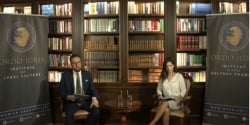Published: 07.05.2021

Effective life and family protection requires joint actions at an international level. This issue was discussed at the conference on the Geneva Consensus Declaration. The event was attended by representatives of state authorities and NGOs from a few countries, including the USA, Brazil, Slovakia and Ukraine. The discussion was devoted to such issues as the protection of human life, the care of women’s health and the strengthening of the family. The conference was held by the Ordo Iuris Institute with a coalition of social organisations from the Three Seas region.
The Geneva Consensus Declaration was signed on 22nd October 2020. The document was created on the initiative of the U.S. Department of Health and the U.S. Secretary of State Mike Pompeo and the Secretary of Health and Human Services Alex Azar (the U.S. President Joe Biden subsequently withdrew support for the Declaration). The event was attended by representatives of over 30 states.
The aim of the last conference was to reaffirm support for the Declaration. Among the participants were representatives of governments of Slovakia (Milan Krajniak – Minister of Labour), Brazil (Angela Gandra – Secretary in the Ministry of Family and Human Rights) and Poland (Paweł Jabłoński – Undersecretary of State in the Ministry of Foreign Affairs). Members of parliaments of Poland, Hungary, Slovakia, Romania and Croatia and delegates of NGOs from Romania, Hungary, Bulgaria and Slovakia were also present at the meeting. The floor was taken also by Valerie Huber – the former U.S. special representative for global women’s health (in Donald Trump’s administration).
“I am immensely proud that Poland became one of the signatories to the Geneva Consensus Declaration. Together with such a large group of other countries, we defend human life as the most important value. As we stressed in the Declaration, every human being has their own right to life. It is an absolutely fundamental right, without which no other right can exist,” stressed Paweł Jabłoński.
“Brazil supports the Geneva Consensus Declaration very strongly. We have an enormous obligation to protect human life, because our country was founded on the Universal Declaration of Human Rights. We want to defend the right to life as a fundamental human right, without which other rights cannot exist,” pointed out Angela Gandra.
“The Geneva Consensus Declaration emphasises standards that are already guaranteed in many international documents – women and men should enjoy equal social, economic and political rights, the contribution of women to society is very valuable, family is a natural and fundamental cell of society, maternity and childhood deserve special care and support, and human life should be protected at every stage of development,” mentioned Tymoteusz Zych, Ph.D., Vice-President of Ordo Iuris.

12.05.2025
In a significant development for Poland’s conservative movement, the newly established Stańczyk Club in Warsaw hosted its first Coalition Meeting last Friday. This event marks the introduction of a model of center-right collaboration that has been influential in the United States since the early 1990s.

09.05.2025
• Representatives of the Ordo Iuris Institute will participate in the Pan-African Conference on Family Values, which will begin on May 12 in Nairobi, the capital of Kenya. Ordo Iuris is a partner of the event.

07.05.2025
• The European Court of Human Rights has upheld a complaint by a same-sex couple whose Polish registry office refused to register a marriage contracted in the United Kingdom. This is the fourth judgment in which the ECHR indicates that Poland has an obligation to ensure that same-sex couples can formalize their cohabitation.

17.04.2025
• The Ordo Iuris Institute has prepared an opinion for the UN as part of a thematic report on surrogacy and its impact on the rights of women and children.